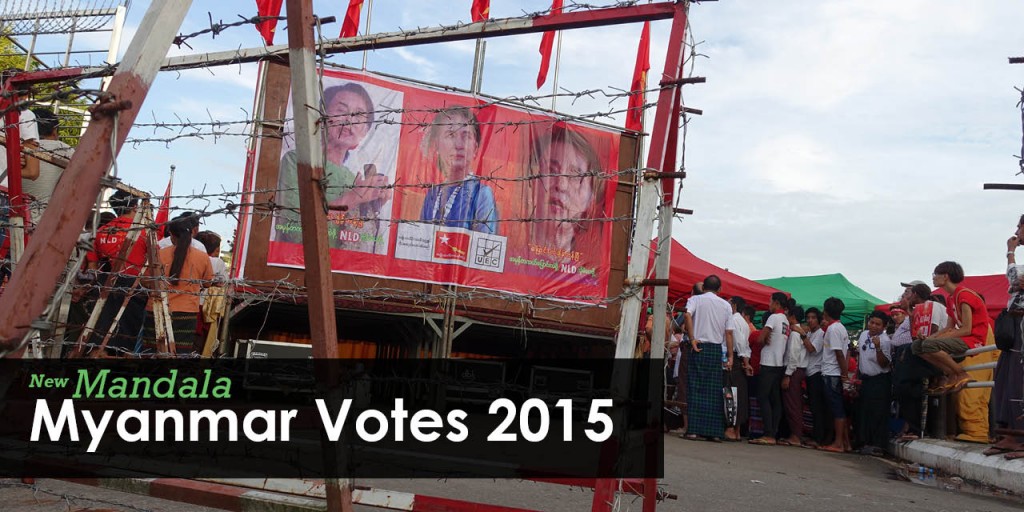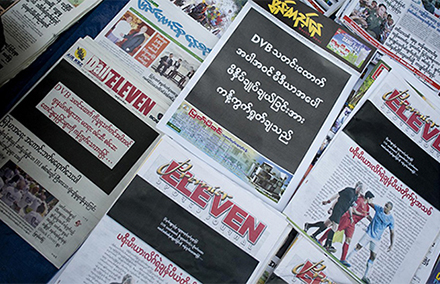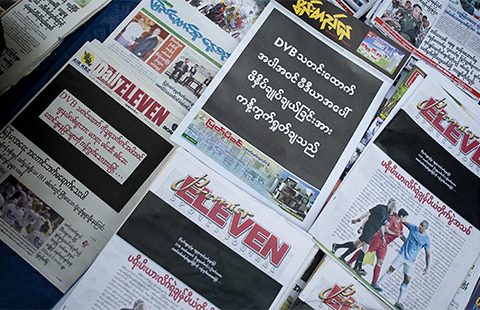
Journalists enjoy ‘relative freedom’ as Myanmar takes to the polls. Meanwhile the country’s literary landscape remains a minefield.
Censorship has long been a hallmark of authoritarian rule, a strategy of repressive regimes to contain the spread of subversive ideas in society.
Prior to 2011, over 48 years of military rule in Myanmar, the power of the written word was stifled. In one of the most restrictive media environments anywhere in the world, the military’s monologue dominated a media culture defined by government mouthpieces. Material deemed offensive was ‘inked over and ripped out’ by censors. Writers and journalists faced imprisonment, torture and even death.
Today, the Myanmar media landscape is now blooming with new publications. The threat of imprisonment for those speaking truth to power has abated somewhat. Radical moves by the current government set it apart from that of the past five decades and include the lifting of pre-publication censorship in August 2012, as well as the ban on daily newspapers.
The return of formerly exiled independent publications to the country similarly suggests true steps towards freedom of expression. Journalists are also amongst those political prisoners freed during the time of transition. However, much like the artists unshackled by censorship relaxation, journalists and writers continue to work with associated risk.
As Myanmar took to the voting booths yesterday, the freedom currently afforded to journalists continues to be an important indicator of the integrity of democratic developments. At times of such political upheaval, the media play an especially critical role in educating and informing the public in the run up to the election and in exposing the realities and irregularities of the historic vote.
Contrasting the present state of censorship with other major moments in Myanmar’s recent political past, the changes are vast. Following the 1988 uprising in support of democracy, which brought a brief surge of independent publications, the military massively raised penalties for newspapers in breach of censorship laws. During the 2007 pro-democracy ‘Saffron revolution’, the government pulled the plug on the Internet for almost three weeks.
The 2010 elections were marked by pervasive censorship and the arrest of journalists. In contrast to recent years, which have seen some positive change, in the year prior to the election in 2010 the government set about investing in a new electronic system of censorship. At the time of the 2010 elections, newspapers such as the foreign-owned The Myanmar Times struggled to get election coverage through the censors and into print. Yesterday’s election tells a very different story, with Myanmar people enjoying access to uncensored information regarding politics through many different mediums.
However, the years 2014 and 2015 have represented a ‘backsliding’ in media freedom for many. There has been an increase in lawsuits against journalists and publishers, who have faced surveillance and imprisonment on charges relating to national security and defamation. Reports that delve into military matters have also proven highly sensitive, and journalists have been denied visas and deported following coverage of issues related to Buddhist nationalism.

High profile cases include the sentencing of five journalists from the Unity Weekly Journal each to seven years hard labour following their reports on an alleged chemical weapons factory. In another 2014 case, five staff members from Bi Mon Te Nay news journal were each sentenced to two years in prison, following false reportage regarding the formation of an interim government by Aung San Suu Kyi. The death of a journalist in army custody has also received significant attention and is the subject of an investigation. These cases serve as a warning to all media workers.
Repressive laws that have been used to imprison journalists and other writers remain in place, including the colonial-era 1923 Official Secrets Act, the 1950 Emergency Provisions Act, the 2000 Internet Act, and the 2004 Electronic Transactions Act. Post-publication censorship still requires published works to be sent in for post-publication analysis. Given these factors, it is perhaps unsurprising that a report published by the Committee to Protect Journalists in April of this year placed Myanmar ninth in the line-up of most censored countries in the world.
Further, the Internet remains an arena under government scrutiny. The reality of this was brought home this month as Myanmar’s ‘penis poet’ was arrested under telecommunications laws on charges of defamation, carrying penalties of up to three years in prison. Several others posting content viewed as offensive on Facebook have had similar charges levelled against them.
Worryingly, the government isn’t the only party out to castigate those who broach sensitive subjects in their writing. Journalists have also faced a backlash of threats and harassment from hard-line Buddhist nationalists. Meanwhile Buddhist-nationalist hate speech targeted at Muslims has gone uncensored and unpunished as laws prohibiting the incitement of racial hatred are selectively applied.
In a further contradiction, NLD member Htin Lin Oo was this year sentenced to two years of hard labour for insulting Buddhism following his condemnation of hate speech on the part of Buddhist monks.
While the activity of journalists continues to be criminalised, a climate of fear means that self-censorship prevails. While in former times the Press Scrutiny and Registration Division (PRSD) drew a clear line that could not be crossed, without pre-publication censorship, Myanmar has been likened to a minefield for journalists, writers and publishers, who are unsure of what they can safely write and publish.
Old and new legislation dots the uncertain landscape and journalists remain exposed and without robust protections of the law, which falls far short of international standards. The broader Myanmar context is of course telling; the judiciary is not independent, meaning unpredictable procedures in trials against journalists, and rights to freedom of expression and assembly continue to be restricted, with activists facing arrest and imprisonment.
Though Sunday’s election resembles another exciting development for the country, journalists are among the many Myanmar citizens who continue to be under threat for the peaceful exercise of their human rights, leaving much to be resolved in whatever the post-election context brings.
Amy Doffegnies is a PhD scholar at UNSW Canberra researching the relationship between religion and human rights in Myanmar. She also has strong interests in issues of freedom of expression and Burmese writers in Myanmar.
This article forms part of New Mandala’s ‘Myanmar and the vote‘ series.
 Facebook
Facebook  Twitter
Twitter  Soundcloud
Soundcloud  Youtube
Youtube  Rss
Rss 